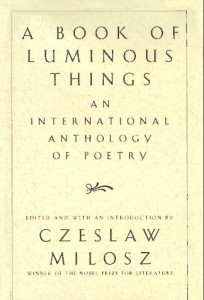Although I am a psychology major, English literature and poetry have always fascinated me. I have taken many English classes while at UR and I have read a number of wonderful novels, short stories and poems. I do have a favorite anthology, though it did not come from my time here at UR. When I graduated high school, my A.P. English teacher handed me “A Book of Luminous Things,” telling me that he hoped that I could find some poems that spoke to me. Over the years, I have found many poems in the anthology that do just that.
This book of poetry, edited by Czeslaw Milosz (what a name!), is a compilation of some of the most interesting, profound and truly bizarre poetry that I personally have ever read. From haikus by Li Po to longer poems by Valery Larbaud, this book brings together poems of all shapes and sizes and from all different time periods. My edition is well read with strategically placed sticky notes marking ones I particularly enjoy. I read this book before I go to sleep and I like to read over some of the best poems almost every night.
Some of my personal favorites are humorous, like Anna Swir’s “I Starve My Belly for a Sublime Purpose,” in which the author speaks to her stomach. Others are incredibly profound and make me want to read certain stanzas over and over, such as Al Zolynas’s “Love in the Classroom.” The editor of the anthology sometimes puts helpful notes before the poems themselves, hoping to provide some insight into the time period that the poem was written in or even about the poets themselves. I find these notes, albeit distracting sometimes, interesting and useful when reading the poems, particularly those from the 13th century, an era that I know very little about. Even if you are the type of person who may not be very interested in poetry but want to learn more, this book is a great starting point.
Sokol is a member of the class of 2013.


